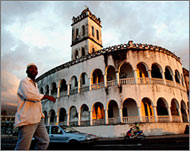Comoros leaders to share power
Comoros leaders and representatives of its semi-autonomous islands have agreed on a power-sharing formula, paving the way for postponed elections in the Indian Ocean nation, sources close to the talks said.

Leaders signed the deal at the end of a regional summit, chaired by South Africa’s President Thabo Mbeki, and which was aimed at resolving a political crisis that has dogged the islands since 1997.
The deal provides for an equitable distribution of tax and customs revenue among the islands and gives control of the army to the union government, leaving command of the police to the autonomous islands.
South African officials, speaking on condition of anonymity, said that representatives from the Comorian parties had committed themselves to holding legislative elections of the union and the islands within four to six months.
A date for the polls was due to be announced later, according to the South African sources.
The legislative polls were scheduled to be held by the end of 2002 but failed to take place.
The power-sharing deal agreed upon on Saturday was provided for in a protocol signed in Pretoria last August between the union and the state’s three semi-autonomous islands: Grande Comore, Anjouan and Moheli.
Constitutional crisis
Anjouan sparked a constitutional crisis in 1997 when it unilaterally broke away from what was then called the Islamic Republic of the Comoros, a move that went unrecognised by the international community.
 |
|
More than 85% of population in |
The rupture was partially healed in 2001 when a new constitution devolved many powers from the central government to the three Comoro islands.
The deal was meant to leave the union government in charge only of affairs of religion and nationality, currency, foreign and defence policy.
But, although presidents have since been elected for the isles and the union, their leaders continued to squabble over who should control what.
Before the talks Mbeki said “the interests of the people of Comoros have to be put first and the leaders have to enter this in a sprit of compromise and an understanding of the need to create the conditions for the people of the Comoros to attend to other problems.
“I don’t think there is anyone among the leaders of the Comoros who would want to be identified as the person blocking Comorians from improving their lives,” he added.
Coup attempts
Saturday’s summit was also attended by the prime minister of Mauritius, Paul Berenger, Madagascar’s Prime Minister Jacques Sylla, former Senegalese president Abdu Diouf, now the secretary general of the international organisation of French speaking countries known as the Francophonie, and the Arab League and France’s Cooperation Minister Pierre-Andre Wiltzer.
Since gaining independence from France in 1975, coup attempts have been staged in the Comoros about 20 times, four of them successful, including one in 1999 that first brought the Union of Comoros president Azali Assoumani to power.
The Comoros, lying between the east coast of Africa and the island state of Madagascar, has a population of some 700,000, of whom some 250,000 live on Grande Comore. More than 85% of the people are Muslims.